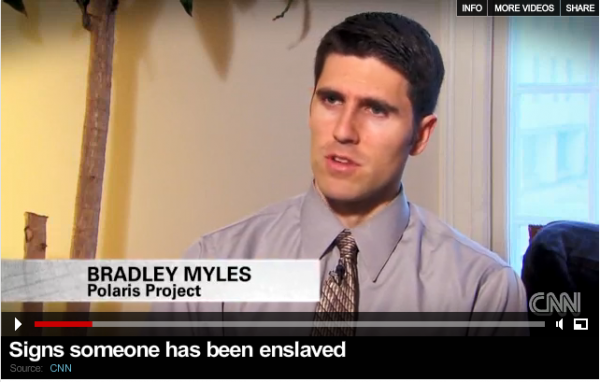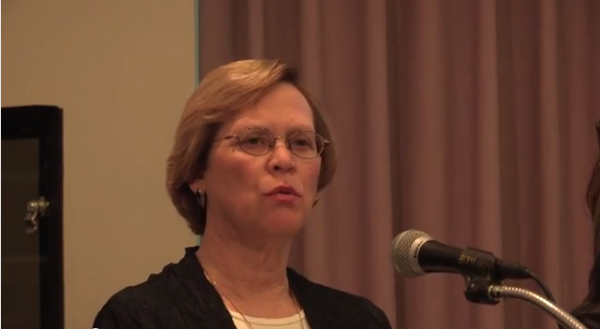For her fourth installment of Big Mother Is Watching You, a guide to prominent anti-sex worker activists and officials, Robin D. takes a look at the major advocates of the 2009 re-criminalization of indoor sex work in Rhode Island, where it had previously been protected by a legislative loophole. She also outlines heavyweight anti-trafficking organization Polaris Project’s major past and current staff members.
Katherine Chon, Polaris Project President and Co-founder

Katherine Chon co-founded Polaris Project with fellow Brown University graduate Derek Ellerman immediately upon their graduation from the Ivy League school in 2002. While sex worker rights organizations operate on shoestring budgets, Polaris operates on about $4 million dollars a year. Chon had read an article about sex trafficking in Korean spas in her home state of Rhode Island and decided that Something Needed to be Done. So, she filed a pro-criminalization memo with the Rhode Island state legislature and launched her NGO. You might remember that at the time, indoor prostitution was not illegal in Rhode Island, and that it was re-criminalized in 2009: “Rhode Island’s lax approach towards the sex industry in recent years has made the overall situation worse,” Chon wrote then, in a blog post entitled “One of the Terrible Two.” The other of the “terrible two” she is referring to is Nevada.
Anti-trafficking advocates often claim that they don’t support criminalizing sex workers, just the people around sex workers. But when the rubber meets the road, their actions put the lie to these claims. Rhode Island is a clear example. Chon and her Polaris Project were up in arms about indoor prostitution being legal in Rhode Island, claiming it tied law enforcement’s hands too much. If we can’t arrest and deport sex workers and trafficking victims, they argued, how will we compel victims to testify against their abusers? Sex workers’ lives are destroyed through open criminal records and deportation. So, some of us believe law enforcement’s hands should be tied a little more when it comes to their treatment of sex workers and trafficking victims. Professor Ann Jordan or American University wrote, in a memo to the Rhode Island Senate,
Through extensive experience with trafficking cases, [Director of the Department of Justice’s Human Trafficking Prosecution Section of the Civil Rights Division, Robert] Moossy has learned that women who are trafficked into prostitution are typically afraid of law enforcement because they fear being prosecuted for prostitution and deported and because they often are highly traumatized. Thus, mass arrests of women for prostitution are extremely unlikely to lead to the identification of trafficked women. Instead, Moossy advises patience, intensive and extensive covert investigations and working with non-governmental organizations that are likely to come across trafficking victims. Law enforcement must assure these organizations that they are only interested in going after traffickers, not their victims, in order ultimately to have the successful prosecution of traffickers. The bill [to recriminalize indoor prostitution in Rhode Island] clearly attempts to use threat of prosecution for prostitution as a blunt instrument to convince women to testify against traffickers. It is extremely disturbing to learn that there is some support for the proposed law because it would allow the police to detain women (apparently for their ‘own good’) so that they can be interviewed as possible trafficking victims.
[…]
Women in prostitution need nonjudgmental support and assistance, not arrest, detention and prosecution.
There are many reasons the Rhode Island recriminalization bill could never have and did not help victims of trafficking, as the Sex Workers Project elaborates on in its memos and releases relating to the legislation. But why did Chon and her allies consider everyone else in the sex trade expendable in the first place?
Chon also participates in whipping up false sporting event-related anti-trafficking hysteria.
Bradley Myles, Polaris Project Executive Director and CEO

Bradley Myles, Polaris CEO, is about as carceral as they come. From 2004-2007, he helped build Washington, D.C.’s Human Trafficking Task Force. He’s big on using third-party tips and Big Data to detect “the signs” that someone has been trafficked rather than using rights or agency-based models when it comes to survivors. He is married to Polaris Project President and co-founder Katherine Chon.
Myles adopted the Palantir Gotham program for Polaris’ use in 2013, “to quickly respond to reported cases of human trafficking.”
Palantir, meanwhile, is the leading Silicon Valley creep-factor company, and that’s saying something. According to Valleywag,
You may not know about Palantir, but Palantir probably knows about you. The CIA-backed company mines massive data sets for clients like the NSA, the Defense Department, the FBI, and many more. In his book, The Finish: The Killing of Osama bin Laden, author Mark Bowden cryptically states that Palantir’s software ‘actually deserves the popular designation ‘Killer App.’ ”
Christopher Adams, Former Polaris Project Director of Operations
Christopher Adams, now a Google employee, was an early Polaris Project employee and was responsible for their 24/7 trafficking hotline. This hotline is actually not anonymous or confidential, though Polaris claims it is because they won’t necessarily share the identity of the caller. But the hotline doesn’t just receive crisis calls, but also tips from completely uninvolved third parties. So the caller and the victim are frequently not the same person, and therefore honoring the confidentiality of the caller doesn’t necessarily mean confidentiality for the victim. And they don’t always try to find out the survivor’s wishes when they receive third party tips. Often, they just go straight to the police or other law enforcement agencies. It should go without saying that this means they often get survivors deported, arrested or detained, dragged into family court against their wishes, and so on. After taking over 85,000 calls, they’ve “identified” 11,000 survivors. What happened to all those survivors? How many calls were crisis calls and how many were tips leading to “raid-and-rescue” operations?
Donna Hughes, University of Rhode Island Professor, Founding Member of Citizens Against Trafficking

One of the most noxious players in the debate over recriminalizing indoor prostitution in Rhode Island was Donna Hughes of the University of Rhode Island. She’s also into piling on more strip club regulations and censoring sex worker advertising venues, despite serious harms to sex workers associated with these policies. She argued for the amendment to the Trafficking Victims Protection Act which dropped the requirement for the federal government to prove force, fraud, or coercion in a trafficking case. This, in addition to the Mann Act, is what allows the government to arrest and charge close-in-age street mentors, fellow victims, and other people who live and work around sex workers as human traffickers under federal law, and in some states, particularly in rural areas, it’s what allows sex workers to be charged with trafficking themselves. This is why the numbers of “pimps” arrested in 2013 in Innocence Lost, an ongoing FBI initiative to conduct stings in cities across the U.S. in the hopes of trapping minors, outweighed the numbers of minors detained significantly. The number recorded under the miscellaneous category of “other arrests,” which mostly referred to the arrests of adult sex workers, also outweighed the minor arrests by about a factor of 10.
Hughes didn’t just testify in favor of recriminalizing indoor sex work, she wrote a letter to the Providence Journal afterward expressing her shock that there were actual sex workers testifying before the state senate against the legislation! Not only that, but several were Asian! One woman, horror of horrors, had tattoos. “I couldn’t make this stuff up!” she writes. What a circus—sounds like an admission that she’s never talked to a sex worker in her life.
[…] Tits and Sass has a pretty good rundown of the key players in the recriminalization of sex work in R…. Well worth your time on the principle of “Know thine enemy”. […]
I should have mentioned this in the piece, but Polaris Project is also a big proponent of “End Demand” style legislation (that does nothing to decriminalize or attempt to decriminalize sex work for the sex worker), even crafting sample legislation for states.
Thank you, Robin, for posting this informative series. I personally find it to be a clear and effective guide to identifying key players, a critical component to understanding who and what our human rights movement is up against. I am presently working as a Chapter Relations coordinator with SWOP-USA, and will be suggesting that our Chapter Reps all examine this series to further their understanding of the political climate in America.
Thanks again, great work.
Savannah
There is an awesome sex worker rights activist Bella Robinson of COYOTE & ESPLERP who is in Rhode Island and has done amazing work in that region. She has challenged Chon directly and it’s a very interesting account.
I would love to see members of the sex worker rights activist community being more supportive of other activists, raising each other up and honoring each other’s good work.
I had to ask myself why she’s not mentioned in this report. I’m going to assume she wasn’t consulted even though the author lives in another region?
Can we honor each other? Can we support each other? Regardless of what Orgs we may be or not be affiliated with? Our movement needs true solidarity to be successful.
Living in Colorado I wouldn’t write a report about Alaska without talking to Tara burns for example. After all, she’s doing good work in that region. It’s an opportunity to raise Tara up and make people aware of what she is doing right? Right.
It’s just my opinion you can take it or leave it, I’m not attempting to disparage the author- my intent is to highlight a means of establishing MUTUAL AID & fortifying the impact of our movement. If people don’t see the value in this- I do find that concerning in terms of being an effective movement rather than just a movement stuck in agitation cycle.
How badly do we really want changes in policy?
Lives are at stake here.
Anyone wanting to write an article about a separate topic should probably write and pitch one here.
Polaris Project has been criticized by journalists, sex workers and some public health advocates. Reason magazine editor Elizabeth Nolan Brown referred to Polaris as “one of the biggest purveyors of bad statistics dressed up as ‘human trafficking awareness'”.